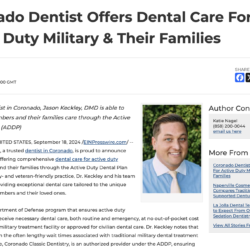Full & Partial Dentures
Quick Facts About Dentures:
- Principle Benefits: Improved appearance, enhanced speech, better chewing, facial muscle support, and increased confidence
- Treatment Process: After an initial consultation, dental impressions will be taken, any necessary tooth extractions or periodontal treatments will be performed, and the custom denture prosthetic will be fabricated
- Types of Dentures Available: Complete dentures (full arch), partial dentures (replaces some teeth, similar to a dental bridge), and implant dentures (overdenture supported by permanent dental implants)
- Provider Expertise: Dr. Jason Keckley has been helping patients restore their smiles with high-quality dentures for over a decade at his Coronado practice
 When tooth loss or severe tooth damage leads to noticeable gaps in your smile, custom-designed removable dentures can beautifully restore a full smile and proper bite. With the help of full and partial dentures that are personalized for a comfortable fit, you can smile, speak, and chew confidently. Our dentist, Jason Keckley, DMD, is experienced and highly skilled in all methods of tooth replacement and will match you with the restorative solution that best aligns with your dental needs, goals, and budget. Removable partials and dentures are frequently considered the most affordable option for tooth replacement and can provide an excellent solution for patients who are not good candidates for dental implants.
When tooth loss or severe tooth damage leads to noticeable gaps in your smile, custom-designed removable dentures can beautifully restore a full smile and proper bite. With the help of full and partial dentures that are personalized for a comfortable fit, you can smile, speak, and chew confidently. Our dentist, Jason Keckley, DMD, is experienced and highly skilled in all methods of tooth replacement and will match you with the restorative solution that best aligns with your dental needs, goals, and budget. Removable partials and dentures are frequently considered the most affordable option for tooth replacement and can provide an excellent solution for patients who are not good candidates for dental implants.
- What Are Dentures?
- Denture Benefits
- Denture Candidates
- Denture Types
- Denture Procedure
- Denture Longevity
- Denture Care
- Denture Cost
- Denture FAQs
What Are Dentures?
Full and partial dentures are removable dental appliances that are custom-designed and crafted to replace several missing teeth or full arches of teeth with beautiful results. Dr. Keckley uses only the highest-quality materials and dental labs to ensure his patients receive comfortable, natural-looking, long-lasting dentures.
What Are the Benefits of Dentures?
Full and partial dentures offer patients a number of potential benefits, such as:
- Improved Appearance: Dentures replace missing teeth, enhancing facial aesthetics.
- Enhanced Speech: Dentures help promote clearer pronunciation by filling tooth gaps.
- Better Chewing Ability: Dentures restore chewing function, aiding in a more varied diet.
- Support for Facial Muscles: Restoring teeth prevents sagging by providing support to facial structures.
- Increased Confidence: Dentures can boost self-esteem by improving smile aesthetics.
- Cost-Effective Solution: Dentures are generally more affordable compared to dental implants.
- Custom Fit: Each prosthesis is designed to fit comfortably in your mouth.
- Removable: Dentures are removable, making them easy to clean and maintain.
- Durable: Appliances are made from sturdy materials to withstand daily use.
- Non-Invasive: Denture treatment does not require surgery, unlike dental implants.
Who Is a Candidate for Dentures?
Nearly any patient with missing or severely damaged teeth can be a candidate for a complete or partial denture. During your initial appointment, Dr. Keckley will perform a comprehensive dental exam to evaluate your oral health, assess the condition of your dental structures, and identify any issues that require immediate treatment. Based on his findings he will discuss the tooth replacement options that are best-suited for your needs. If you are interested in complete or partial dentures, Dr. Keckley can develop a customized treatment plan for improving your dental health and creating your removable dental appliances. In some cases, patients who come to Dr. Keckley to learn about dental implants may find that they are not good candidates; however, he may instead suggest full or partial dentures as an alternative option for creating the full smile they desire.
What Types of Dentures Are Available?
Partial Dentures
Partial dentures are designed to replace multiple adjacent teeth on an arch in a similar fashion to dental bridges. They are typically held in place using a custom-designed appliance that anchors to the surrounding natural teeth and over the gums for a comfortable, stable fit. In some cases, dental implants can also be used to secure a partial denture or bridge in place. Dr. Keckley can go over the different options with you after an examination of your mouth and oral structures.
Full Dentures
Full dentures—also called complete dentures—are used to replace full arches of missing teeth. These removable appliances are custom-designed to fit comfortably over the gums and are held in place using either suction or denture adhesives. Dr. Keckley has helped many patients obtain total smile restorations using traditional dentures, and they can provide patients who are either ineligible for or uninterested in dental implants with a functional, aesthetically pleasing, and cost-effective solution to tooth loss.
Implant Dentures
Implant dentures are an innovative full-arch replacement option that use dental implants—typically 4-6 per arch—to anchor a denture prosthesis. Unlike traditional dentures, implant-supported dentures are typically not removable, and many patients appreciate the enhanced security and convenience they provide. Dr. Keckley can assess your candidacy for an implant-anchored restoration during your consultation.
Learn More About Implant Dentures
What Happens During the Denture Procedure?
The process of preparing you for and creating your custom dentures may require multiple visits to our office. Dr. Keckley’s top priority is always achieving a foundation of optimal dental health prior to performing further treatment, and for many denture patients this can involve tooth extractions and periodontal treatments, among others. When extractions have healed and treatments have been completed, Dr. Keckley can take impressions of the mouth from which the full or partial dentures can be designed. These impressions are sent to a trusted dental lab where the dentures will be fabricated from high-quality materials. The goal is always to create removable tooth replacement devices that match the natural appearance of any healthy remaining teeth and/or suit your facial appearance/proportions. Choosing the right tooth color, shape, and size, along with the right shade of gum tissue, is critical to creating a beautiful, natural-looking smile when the dentures are in place. When the finished dentures return to our office from the lab (usually within two to three weeks), Dr. Keckley checks their fit and appearance and may make some small adjustments based on his observations and your feedback. While full dentures stay firmly in place using suction and/or a specialized adhesive, partial dentures rely upon a detailed framework which fastens around natural teeth and over portions of the gums for a secure fit.
How Long Do Dentures Last?
With proper care and maintenance, your dentures can last for many years—or even over a decade. Dr. Keckley partners with a trusted dental lab that custom-fabricates every pair of dentures using high-quality materials, promoting optimal longevity. We also encourage our patients to properly care for their dentures by maintaining good hygiene habits.
That said, no matter how durable and well-made your dentures are or how well you take care of them, they will likely still need to be replaced eventually. This is because the shape of your gums, jawbone, and facial muscles gradually change over time. While the lifespan of your dentures can often be extended by periodic relining—where the underside of the denture is reshaped to provide a more secure and comfortable fit—there will likely come a point where an entirely new prosthetic is needed. Dentures may also need to be replaced sooner if they sustain damage or become aesthetically dissatisfactory due to staining or wear. If you have concerns about your dentures or if they are not fitting properly, we encourage you to reach out to Dr. Keckley as soon as possible.
How Do I Care for My Dentures?
Caring for your dentures properly and carefully is the key to keeping them in great condition long-term and supporting optimal oral health. When you receive your dentures, Dr. Keckley will review care instructions with you so that you are fully informed. Not all dentures require the same type of care, but these are some general care guidelines that apply to most dentures:
- Brush your dentures daily to keep them clean. Be sure to brush gently with an extra soft-bristled brush and non-abrasive toothpaste to prevent scratching and dulling the surfaces.
- When you remove your dentures, thoroughly clean your mouth using a soft brush, including all soft tissue and any remaining natural teeth. Be careful to remove any denture adhesive from your mouth, if applicable.
- Depending on the materials your dentures are fabricated from, you may need to soak them overnight, either in denture solution or water.
- Bring your denture appliances with you to your dental cleanings and exams so that Dr. Keckley can check for a proper fit and make any necessary adjustments.
- If you notice any damage, discomfort, slippage, or a loose fit, contact Coronado Classic Dentistry right away to make an appointment.
How Much Do Dentures Cost?
Full and partial dentures vary in price based on a variety of factors, which Dr. Keckley and our office team can discuss with you. Once your personalized treatment plan has been developed, you will receive a detailed estimate for the full cost of your care. If you have dental insurance our knowledgeable office team can check your benefits to determine what portion of your treatment plan is covered and if there are any out-of-pocket costs you may be responsible for. To help make paying for your care as affordable and convenient as possible, we offer a wide range of financial options which include in-office payment plans with low-APRs. Our team is always happy to work with you so that you can achieve the full, healthy, beautiful smile you deserve.
Additional Frequently Asked Questions About Dentures
Are Dentures Comfortable?
Each set of dentures from Coronado Classic Dentistry is custom-crafted for optimal fit and comfort. From your initial consultation all the way through to your final fitting and adjustment, Dr. Keckley takes a meticulous approach to ensuring your dentures look, function, and feel as natural as possible. If your dentures ever begin to slip, chafe, or feel loose, we recommend scheduling an appointment with Dr. Keckley, as they may need to be relined.
Can I Whiten My Dentures?
We strongly advise against attempting to whiten your denture prosthetic, as this can cause damage to the appliance. While your false teeth are designed to look as natural as possible, they are made from a different material than regular teeth and therefore do not respond to whitening agents in the same way.
Fortunately, there are other ways to address denture staining and discoloration. Maintaining good oral hygiene, brushing your dentures at least once a day, and soaking them frequently can help prevent plaque and stains from building up in the first place. If you do notice staining, soaking your dentures overnight in a denture-specific cleaning solution—or a mixture of water and either white vinegar or baking soda—can potentially help improve discoloration. In cases where at-home methods do not produce satisfactory results, Dr. Keckley can professionally clean and polish your dentures to help them regain their original color and luster.
Will Dentures Affect My Speech?
Many patients report that wearing their new dentures does require an initial adjustment period, during which time they may notice some slurring or lisping. However, this typically passes within a few weeks, as your facial muscles grow accustomed to your new appliance. Reading aloud can be an excellent way to more quickly grow accustomed to speaking clearly with your dentures in.
What Can I Eat With Dentures?
Once patients get used to wearing their dentures, they should be able to eat most foods with relative ease. That said, it is generally best to avoid particularly hard or chewy foods, like nuts, beef jerky, and corn on the cob. This is because excessive amounts of chewing and grinding can place stress on your gums and create sore spots. For new denture wearers, we typically recommend starting off eating primarily soft foods—such as oatmeal, well-cooked pasta, yogurt, and mashed potatoes—and working up to harder or more chewy foods over time as you adjust to your new appliance.
Do you have questions about natural-looking tooth replacement solutions? Contact Coronado Classic Dentistry to schedule an appointment with Dr. Keckley.


